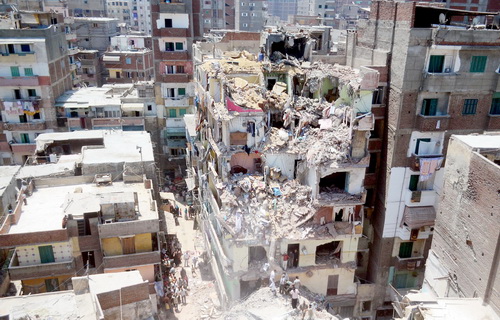Minister of Housing Mostafa Madbouly and Minister of International Cooperation Sahar Nasr agreed to start working on securing $1bn worth of loans and grants needed to fund the Egyptian state’s plan to restructure the informal housing segment, according to an official statement.
The budget for redeveloping the informal housing segment is EGP 10bn. The “redevelopment” project is being financed from the state budget, while the procurement of loans and grants is to be infused into the larger informal housing sector development project.
The informal housing segment is a burgeoning topic of concern for the state as, according to previous announcements by the Egyptian Initiative for Personal Rights (EIPR), a total of 387 recorded structures have collapsed between July 2012 to June 2013, causing the death of 183 persons, injury of 375, and displacement of 815 families.
Several residential buildings have collapsed in Egypt in the past few months. In Giza, residents were able to flee a four-floor residential building as it collapsed in the Faisal neighbourhood. Prior to that, two other buildings collapsed in Alexandria, causing four fatalities and eight injuries when a deserted building collapsed in the Cleopatra district.
Madbouly decided to allocate €13m from a grant by the German Society for International Cooperation (GIZ) on 3 October for the project. The minister urged GIZ officials to put in place a programme to develop unsafe informal housing and to acceleerate the project’s procedures.
A total of EGP 1bn was also allocated to develop the informal housing sector in the Economic and Social Development plan in the FY 2015/2016 state budget.
Madbouly sat down with Deputy for Urban and Informal Housing Development Ahmed Darwish Sunday to discuss the development plan for the informal housing sector. They agreed to implement the plan for “first and second degree hazardous” structures within three years.
The scope of the ministry’s action will be broad as it is planning to remove all residential areas that have houses with “life threatening” conditions and are likely to collapse, an area that spans 248 areas.
The three year plan started in the current fiscal year. In the first year, the majority of areas with structures the government judges to be hazardous to the occupants’ lives will be removed. For the following two years, the government has pledged to renovate and developed these areas with proper housing units.
On 11 October, Madbouly announced that development works on 47 informal housing sectors in Cairo and Giza are almost completed. A total of 34 of these areas are in Cairo and the rest are in Giza. Construction works included paving roads, renovating buildings, installing fire hydrants and street lights, and sanitation and irrigation works.
Madbouly said development works are currently taking place in another 40 areas in 18 Egyptian governorates. The development plans are conducted with engineering professors and students in Egyptian universities. A protocol between the housing and education ministries will be signed to make their agreement official.
The protocol will be signed with the Ministry of International Cooperation to accelerate the process instead of assigning the job to engineering consulting offices, Madbouly said.
The informal housing sector development project is part of the sustainable development strategy for Egypt 2030. The strategy was developed by the Ministry of Planning and announced in March 2015.


